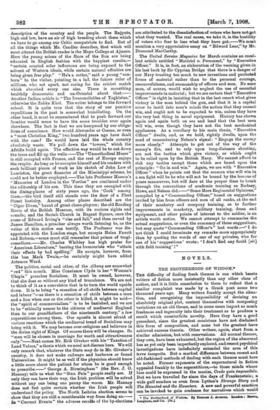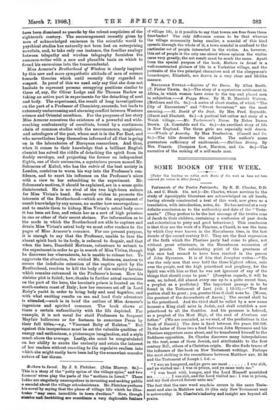NOVELS.
THE BROTHERHOOD OF WISDOM.*
THE difficulty of finding fresh themes is one which besets writers of fiction more insistently than any other class of author, and it is little consolation to them to reflect that a similar complaint was made by a Greek poet some two thousand years ago. Many writers frankly accept the situa- tion, and recognising the impossibility of devising an absolutely original plot, content themselves with composing variations on an old theme, and in some cases import so much freshness and ingenuity into their treatment as to produce a result which counterfeits novelty. Here they have a good precedent, since the greatest musicians have not disdained this form of composition, and none but the greatest have achieved success therein. Other writers, again, start from, a similar admission, but with reservations. All normal themes, they own, have been exhausted, but the region of the abnormal has as yet only been imperfectly explored, and recent psychical investigations have indefinitely extended the area of this terra incognita. But a marked difference between recent and old-fashioned methods of dealing with such themes must here be noted. Former exponents of the supernatural in fiction appealed frankly to the superstitious,—to those minds whose bias could be expressed in the maxim, Credo gala impossibile. But we have travelled far since the days of Frankenstein; a wide gulf sunders us even from Lytton's Strange Story and The Haunted and the Haunters. A new and powerful sanction can be invoked to gain credence for narratives which would • The Brotherhood of Wisdom. By Frances J. Armour. London: Brown. Laugh:um and Co. [65.]
have been .dismissed ruipiserile by the robust scepticiam of the eighteenth century. The encouragement recently given by men of acknowledged eminence in the scientific world to psychical studies has naturally not been lost on enterprising novelists, and, to take only one instance, the familiar analogy between telepathy and wireless telegraphy furnishes the romance-writer with a. new and plausible basis on which to found his excursions into the transcendental.
Miss Armour's Brotherhood of Wisdom, is clearly inspired by this new and more sympathetic attitude of men of science towards theories which until recently they regarded as suspect. In proof of this we need only say that she does not hesitate to represent persons occupying positions similar to those of, say, Sir Oliver Lodge and Sir Thomas Barlow as taking an active part in experiments for the detaching of soul and body. The experiment, the result of long investigations on the part of a Professor of Chemistry, succeeds, but leads to extremely embarrassing and alarming conflict between Western science and Oriental occultism. For the purposes of her story Miss Armour conceives the existence of a powerful and wide- reaching confraternity of occultists, bound by a continuous chain of common studies with the necromancers, magicians, and astrologers of the past, whose seat is in the Far East, and who nevertheless keep themselves informed of all that is going on in the laboratories of European researchers And thus, when it comes to their knowledge that a brilliant English chemist has solved the riddle of detaching the spirit from its fleshly envelope, and projecting the former on independent flights, one of their emissaries, a mysterious person named Mr. Solomons of Kabul, who has the entrée of the best society in London, contrives to worm his way into the Professor's con- fidence, and to exert his influence on the Professor's niece with a view to her submitting to the experiment. Mr. Solomons's motives, it should be explained, are in a sense quite disinterested. He is no rival of the two high-born suitors for Miss Vivian's hand. He merely wishes to promote the interests of the Brotherhood—which are the acquirement of occult knowledge by any means, no matter how unscrupulous— and, to enable them to kidnap Miss Vivian's astral body once it has been set free, and retain her as a sort of high priestess in one orother of their secret shrines. For information as to the mode in which the Brotherhood are able to capture and detain Miss Vivian's astral body we must refer readers to the pages of Miss Armour's romance. For our present purpose, it is enough to say that the Professor, unable to lure the absent spirit back to its body, is reduced to despair, and that when the hero, Danefield Mottram, volunteers to submit to the experiment in order to go in search of Miss Vivian, though he discovers her whereabouts, be is unable to release her. To' aggravate the situation, the wicked Mr. Solomons, anxious to secure the indefinite retention of the captive spirit by the Brotherhood, resolves to kill the body of the unlucky heroine which remains entranced in the Professor's house. How his sinister plot is foiled; how, thanks to further astral excursions on the part of the hero, the heroine's prison is located on the south-eastern coast of Italy ; how her rescuers set off in Lord Roby's yacht in order to bring body and soul together, and with what exciting results on sea and land their adventure is attended,—such is in brief the outline of Miss Armour's ingenious and spirited romance. The book shows at times a certain unfamiliarity with the life depicted. For. example, it is not usual for staid Professors to frequent Mayfair ballrooms or for footmen to announce Peers by their full titles,—e.g., " Viscount Roby of Ralston." But against this inexperience must be set the valuable qualities of ' energy and enthusiasm, a picturesque imagination, and a style much above the average. Lastly, she must be congratulated on her ability to excite the curiosity and retain the interest of her readers without resorting, to the repulsive realism into which she might easily have been led by the somewhat macabre nature of her theme.















































 Previous page
Previous page